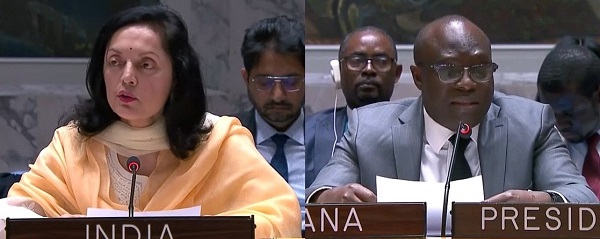United Nations, (Samajweekly) UN Security Council (UNSC) President Vanessa Frazier said that the Delhi Declaration adopted under India’s leadership symbolises the Council’s determination to meet terror threats using new technologies.
Several UNSC members joined her on Thursday in welcoming the Declaration adopted in October 2022 at a special meeting of the Council’s Counter-Terrorism Committee (CTC) held in Delhi as they warned of the dangers of new technologies in the hands of terrorists.
Frazier, who is Malta’s Permanent Representative, recalled being at the meeting in Delhi and said that the Declaration “symbolises the Council’s shared determination to address this challenge” from terrorists using new technologies.
CTC Chair Lana Nusseibeh said: “As the current Chair of this Committee, the UAE intends to build on this important achievement.”
She said the Committee “took a key step last year by adopting the Delhi Declaration which offers non-binding guidance to stakeholders on how to counter the terrorist use of new and emerging technologies”.
Nusseibeh, who is the Permanent Representative of the United Arab Emirates (UAE), succeeded India’s Permanent Representative Ruchira Kamboj as CTC head.
Russia’s Deputy Permanent Representative Gennady Kuzmin said: “We welcome efforts made last year by India in its capacity as Chair of the CTC, thanks to which the Delhi Declaration was elaborated to counter the use of new and emerging technologies for terrorist purposes.
“Terrorists keep adjusting their tactics, widely use ICTs (internet, communication technologies) not only for financing their criminal activities, but also for spreading their ideology and plotting attacks. This is a universal problem that requires well-coordinated inter-state prevention mechanisms.”
Ecuador’s Permanent Representative Hernan Perz Loose said: “The use of technology to spread a narrative of violent extremism and the use of drones by terrorist groups constitute new challenges for the international community.”
The Delhi Declaration “is an example of how the Security Council can respond to the changing nature of terrorism”, he said.
Switzerland’s Permanent Representative Pascale Christine Baeriswyl said that “with the Delhi declaration the Committee has a solid basis to consider” the threats from the Islamic State (IS) terror group using new technologies.
Earlier while presenting Secretary-General Antonio Guterres’s report on the threat from IS, Under-Secretary-General Vladimir Voronkov said said that the group’s use of new and emerging technologies “remains a key concern”.
The group continues to deploy unmanned aerial systems for surveillance and reconnaissance while using social media and video games to radicalise and recruit new supporters, he said.
The report noted that the IS has threatened to attack India’s diplomatic mission in Afghanistan.
It said that the terror outfit “remained a significant terrorist threat in Central and South Asia, and the group retained ambitions to conduct external operations” and that “it had positioned itself as the primary rival to the Taliban and was reportedly set to portray the Taliban as incapable of providing security in the country”.










